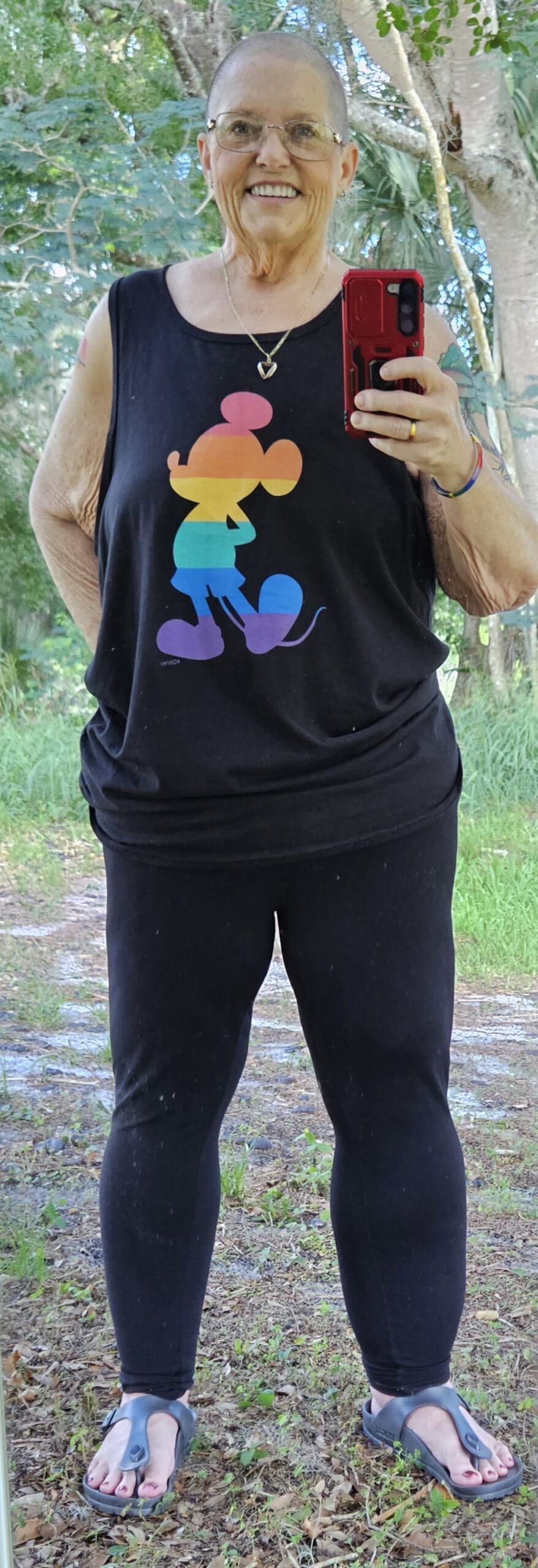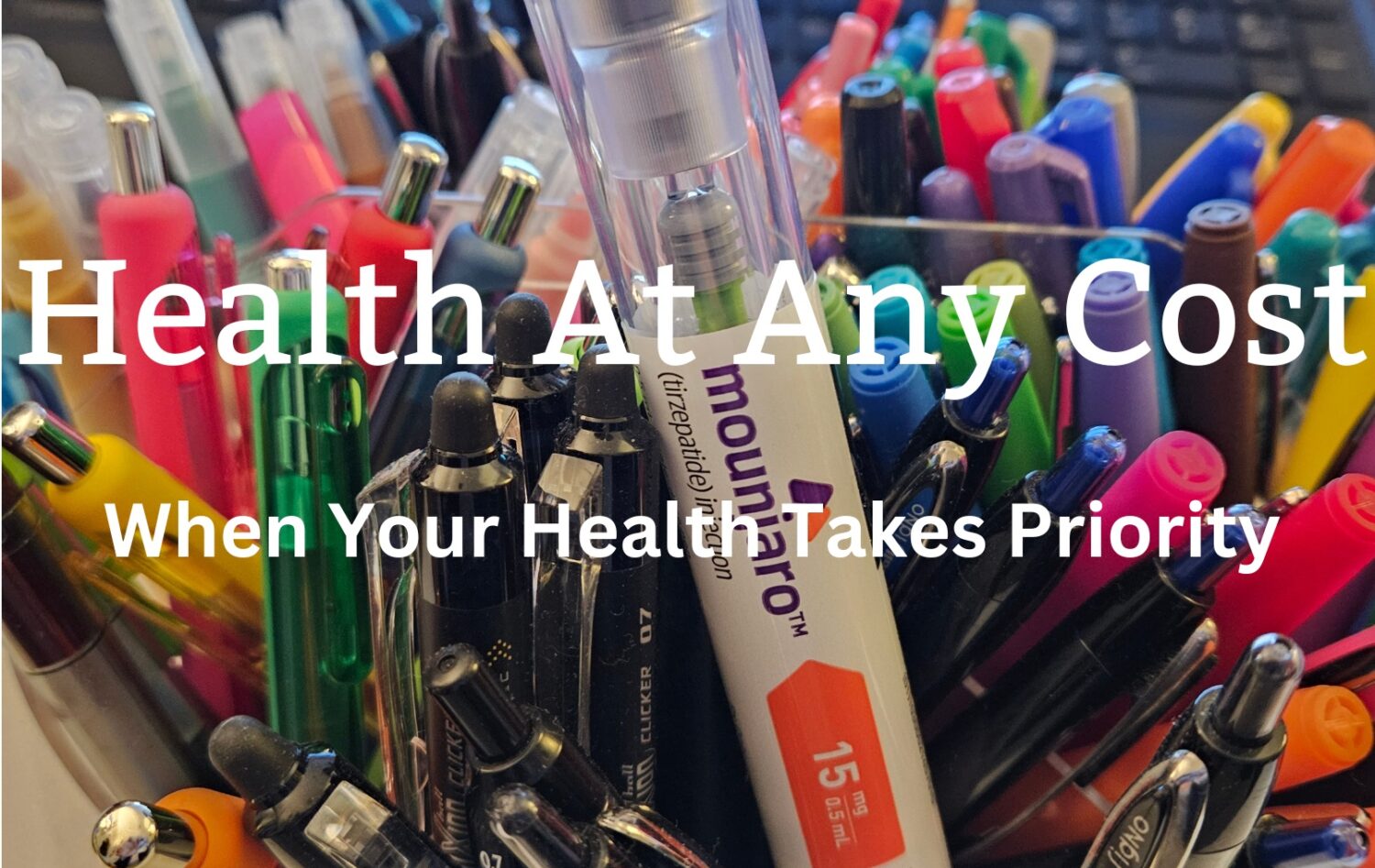I’d heard of others feeling dizzy on GLP-1s, and even though there is no warning on the box, I took my own dizziness in stride. So what if I was dizzy when I sat up or stood up too fast. That happens to lots of people according to Dr. Google.
Advice from Dr. Google: Go from lying down to sitting until the dizziness passes, then stand slowly from sitting.
Dr. Google says to not do these things:
- Don’t be dehydrated.
- Don’t vomit or have diarrhea that might make you dehydrated.
- Don’t be old.
- Don’t have high blood pressure.
- Don’t be drunk.
- Don’t be taking diuretics.
- Don’t have a fever.
- Don’t be sick in bed for a long time.
And Then Dizziness Tossed Me Onto the Floor
I wasn’t doing anything of the wrong things, either.
I was drinking plenty of water. The only side effect I have from Mounjaro and tirzepatide is mild constipation, so no nausea, vomiting, or diarrhea there. I don’t have high BP anymore. No fever. No diuretics for a year. And I’m anything but in bed all the time now.
However, I am 63 years old, but there’s not much I can do about the “don’t be old” admonition.
When I got up in the night to go to the bathroom, apparently I moved too fast and fell backwards onto my skinnier tuchus, right on the floor.
The next morning, with my blood pressure cuff Velcro’d around my wrist, I re-created the dizziness on purpose so I could get BP readings for the cardiologist I was seeing in two days.
First, lying down:
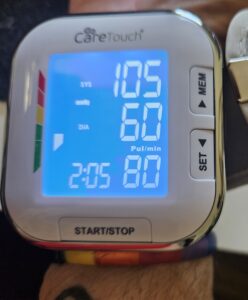
Then, sitting up:
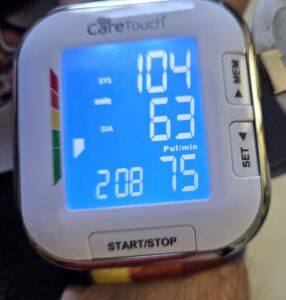
And then standing:
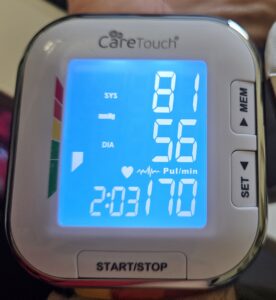
Orthostatic Hypotension
Orthostatic hypotension — also called postural hypotension — is a form of low blood pressure that happens when standing after sitting or lying down. Orthostatic hypotension can cause dizziness or lightheadedness and possibly fainting.
Orthostatic hypotension can be mild. Episodes might be brief. However, long-lasting orthostatic hypotension can signal more-serious problems. It’s important to see a health care provider if you frequently feel lightheaded when standing up.
I was able to show my cardiologist the numbers when I saw her and she said yes, it is orthostatic hypotension.
As she went down the list of questions, her first was, “Are you still on Lasix?” No, I stopped the diurectic last year when you told me to.
She asked the usual questions I mentioned above and then she looked at my chart on the computer and said, “You are being overmedicated on the Metoprolol.”
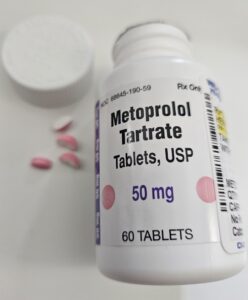
I was taking Metoprolol Tartrate, 50mg. twice a day as prescribed from two years earlier. It was not changed last year at my cardiology visit, but now I was down 105 lbs. from the previous year and 225 from when it was initially prescribed. She said I was taking too much of the medication. She said to halve it… now 25mg. twice a day… and then we would see if that helped. She wanted to see me in a month and if I was still dizzy, she would take me off of it. WOO HOO! I would be so happy to get off the heart medication!
I was put on Metoprolol Tartrate after my hospitalization for cardiac and lung complications from COVID in 2022. I was having PVCs – Premature Ventricular Contractions – when my heart was skipping every third beat. The feeling for me was a fluttering that was often short-lived, but was also of a longer duration at times. Metoprolol evens up the rhythm of the heart and my fluttering from the PVCs lessened over time. I don’t remember when the fluttering stopped, but it was at least six months after starting the medication.
I had an EKG during this office visit to make sure all was well and the PVCs were gone. Hallalujah!
Now On the Lower Dose…
I feel so much better! The dizziness was being caused by being overmedicated. It’s been a couple of weeks on the new dosage and the major swirling is gone, but there is still mild hypotension happening. I need to do my Lie/Sit/Stand test with the BP cuff, though, but want to wait a bit longer until it is closer to the cardio appointment.
Edit Add: The cardiologist also told me I needed to eat salt. Yes, salt. A doctor telling me to eat salt was just weird. When I was in the hospital in 2022, I was taken off all added salt and told to eat no/low sodium foods. It’s now been two years since I have had salt in my house. I keep forgetting to add salt to my food, which I think is so amusing. But I have a salt shaker again and now I am eating a few grains of salt with each meal.
The Moral of the Story
I will write a whole post about this topic because I think it is a crucial point: If you are losing weight on GLP-1s and are on medications for co-morbidities from having clinical obesity, please keep an eye on your changing symptoms because you might need medication and/or dosage changes as you lose weight. Even small amounts of weight loss can make a huge difference in your health, so if you have any odd symptoms at all, check with the doctor who prescribed the medication to see if you might need a shift in dosage or even a medication change.
Here’s to getting healthy!!
